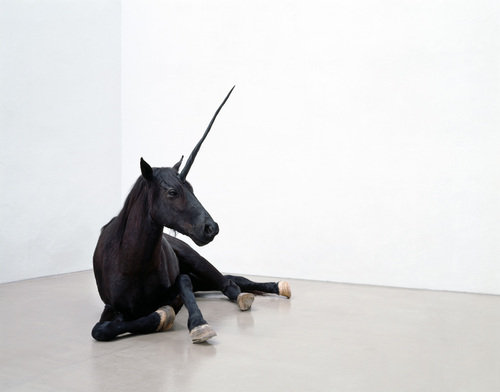Olaf Nicolai
dal 26/3/2008 al 9/5/2008
Segnalato da
26/3/2008
Olaf Nicolai
Carolina Nitsch Project Room, New York
Considering a multiplicity of appearances in light of a particular aspect of relevance. Or: Can art be concrete? Conceived by the artist as a single work, the project consists of 16 unique color prints on custom painted walls and 400 unique color books displayed on tables across the room.

Conceived by the artist as a single work, the project consists of 16 unique color
prints on custom painted walls and 400 unique color books displayed on tables across
the room. Prints and books were done as high-quality Iris prints with the artist
randomly feeding different colors one at a time into an offset printing machine. The
mechanical movements of the printing make the resulting color mix on each sheet a
unique, never to be repeated print. This rarely used process - unlike most
commercial printing – allows pure color printing without any dot screens.
The 16 framed prints represent the first 2 and final 2 prints from a double-sided
printing series of 400 sheets, thereby showing the significant changes in the color
mix during the entire printing process. The remaining print run of 400 sheets is
split up and made into 400 unique 64-page color books. Though the prints show
noticeable differences, the general impression at first seems to be one of
standardized color repetitions.
The work is shown for the first time in the U.S. and illustrates both the conceptual
complexity and the physical beauty, Nicolai’s work is known for. The artist often
uses everyday objects and cultural products as well as historical references. In his
work he combines current questions in politics and contemporary culture with a
wide-ranging interest in the natural sciences, architecture, aesthetics,
iconography, and history. As the jury of the distinguished City of Wolfsberg Art
Award noted, Nicolai’s focus is on the construction and exploration of new aesthetic
contexts, often playing with the difference between naturalness and artificiality.
“Nicolai performs a role as a researcher and combiner – a
turner-upside-down-of-things – to see what they look like from another angle, and
ultimately create new models of visibility …”, states Charles Esche and continues,
“Art, Nicolai seems to be saying, is a way of looking at the world through aesthetic
senses, rather than a discrete methodology for the production of high value objects
… Nicolai turns the innovative drive of art on its head. In a world where everything
is represented, it’s the processing of these representations that offers something
new. “
Or as Vincent Pécoil noted: “Nicolai proposes the idea that artistic work, far from
being an innocent formal game, could be a method for engaging with forms, thereby
offering a possible definition for today’s art. If concepts are tools and philosophy
the box that contains them (as Deleuze and Foucault termed it), art can be viewed as
the practice of living in forms, and works of art as specific exercises.”
These key elements of Nicolai’s work are all fully integrated and visible in this
comprehensive installation. By radically focusing on the specific technique of Iris
printing, Nicolai continues and expands his research into the “politics of forms”
and into the significance of the sensual for political statements. Iris printing,
rarely used today, was often applied for political flyers in the sixties and
seventies, combining the technique’s glamour with the politics of that time.
Olaf Nicolai has had numerous solo shows, more recently including YEUX DE PAON,
Galerie Weltecho, Chemnitz (2008); THE BLONDES, Stadtraum Eppendingen (2007) ; La
Lotta, Galerie EIGEN+ART, Leipzig (2006) ; Leonhardi Museum, Dresden (2006) ; Odds
and Ends, Projektraum enter, Kunstmuseum Thun, Schweiz (2004) ; Privacy: A programme
of symposia, The Henry Moore Foundation, Protoacademy, Edinburgh, Schottland (2004).
His participation in group shows include among others Athens Biennial (2007), HALF
SQUARE, HALF CRAZY, Centre National d'Art Contemporain of the Villa Arson (2007) ;
Modelle für Morgen, European Kunsthalle Köln (2007) ; Wiederaufbau Flamme der
Revolution, Städtischen Galerie Wolfsburg (2007) ; The Freak show, Musée d’Art
Contemporain de Lyon (2007) ; Nature Design, Museum für gestaltung, Zürich (2007) ;
Ordnung + Verführung, Haus Konstruktiv, Zurich, Switzerland (2006) ; Play station,
Sprengel Museum Hannover (2006), This is america,!, Central Museum Utrecht,
Netherlands (2006) ; Eye on Europe: Prints, Museum of Modern Art, New York (2006),
mozart 06, Salzburg, Austria (2006) ; Venice Biennial (2005, 2001), Tokyo Blossoms,
Hara Museum of Contemporary Art, Tokyo (2006), Sydney Biennial (2002), Documenta X
(1997).
Books and catalogs on Olaf Nicolai’s work include La Lotta (2006), Parkett 78
(2006), Rewind – Forward (2003), Enjoy – Survive (2001), 30 Farben (2000) and other
titles. His new 3 5mm Film “Rodakis” was invited to the Forum expanded section of
the Berlin Film Festival (2008).
Olaf Nicolai received among other prizes the distinguished City of Wolfsburg Art
Award (2002), the Villa Aurora grant (2007), the PS1 grant (1998), and the Villa
Massimo grant (1997).
Olaf Nicolai’s works and editions published by Carolina Nitsch include Yeux de Paon
(2007), Ballack (2007), 30 Farben (2005), Flamme der Revolution (2004), and Bluete
(1997-2001).
Open on Thursday, March 27, with a reception on Friday, March 28, from 6 – 9pm
Carolina Nitsch Project Room
534 West 22nd Street - New York
Tues–Sat 11 am–6 pm
Free admission



